13 常见句型的翻译
13 读后续写 动作描写--- 哭笑说看思考---读后续写万能句型写作模板与句子翻译练习

13 读后续写动作描写--- 哭、笑、说、看、思考---读后续写万能句型写作模板与句子翻译练习一哭的动作cry哭泣,流泪;weep啜泣,不出声的哭sob哽咽,啜泣,哭诉blubber放声大哭,又哭又闹whimper啜泣,呜咽a tear slid down one's cheek 一滴泪顺着某人的脸颊滑落下来1. Most of us were in tears by the time he'd finished his story.他讲完故事时,我们大多数人都已泪流满面。
2. Jane turned to me with tears in her eyes,and begged me to help her.简眼里含着泪水转向我,恳求我帮帮她。
3. Laura burst into tears and ran out of the room.劳拉突然哭了起来,然后从房子里跑了出去。
4. Bill fought back his tears and tried to comfort Sarah's mother.比尔抑制住泪水,并试图安慰萨拉的母亲。
5. Joe’s e yes were watering from the smoke that filled the room.乔的双眼正被满屋的烟雾熏得淌眼泪。
6.I left quickly, not wanting to break down in front of the children.我赶快离开了,因为我不想在孩子们面前大哭。
7. There was a lump in my throat and I didn't speak be cause I knew I would cry. 我哽咽了,没有说话,因为我知道我会哭的。
二笑的动作smile微笑laugh发笑,大笑beam面露喜色,带有笑容sparkle闪耀,闪烁smile bitterly苦笑force a smile勉强的笑laugh heartily开怀大笑grin咧嘴笑chuckle轻轻地笑giggle咯咯地笑row with laughter疯狂大笑1.Joy welled up in his heart.喜悦油然而生。
高考常用于考时态的十大句型、固定搭配和情态动词

常用于考时态的十大句型常考固定搭配情态动词的用法1、sb was doing sth when…某人正在干某事这时……I was thinking about my new plan whan a good idea occurred to me. 我正在考虑我的新计划,这时一个好主意浮现出来。
说明:在这个句中,主句的谓语动词通常是延续性动词,从句的失态用一般过去时,when 翻译成“这时”。
2、sb was(just) about to do sth when…,某人正要干某事这时……They were just about to set out when it began to rain.他们正要出发,这时下起雨来了。
说明:在这个句型中,be (just) about to do 可以换成sb was/were on the point of doing sth when…, when翻译成“这时”。
3、sb had just done when…某人刚干完某事这时……I had just lain down when the telephone rang.我刚躺下,这时电话铃响了。
说明:在这个句型中,just用于加强语气,也可以不要,when翻译成“这时”。
4、it is the first/last…time that sb has/have done…某人第几次干某事……It is the second time that we have visited yourfirm.我们是第二次参观你们的公司。
说明:在“某人第几次干某事”这个句中,that之后的时态要用现在完成时,如果主句是it was…,从句时态随之换成过去完成时。
例如:It was the third time that we had seen this film star.我们是第三次看见这个电影明星。
5、Hardly had sb done…when sb did…某人刚刚干完某事这时…….Hardly had they arrived at the airport when they received a warm welcome.他们一到机场就受到了热烈欢迎。
英语翻译常用句型

翻译中常见的句型1.否定句型1)部分否定。
其否定意义只局限于整体中的一部分。
其形式:“概括词all, every等+not+谓语动词”。
常用于该句型词:all, both, everybody, everywhere, always,altogether, entirely, wholly等。
All is not gold that glitters.I do not wholly agree.2) 完全否定。
其形式:no, none 等否定词+肯定式谓语。
常用于该句型词:no, none, nobody, nothing, nowhere, never, neither, nowhere, nowise, 等。
还有一种句型:all等概括词+肯定式谓语+否定意义的词。
No words can describe the scene.任何言词均不能描绘那景色。
All his plan came to nothing.3)双重否定a.主语+cannot+ help/refrain/keep + from + v-ingHe could not help showing his pleasure.他不由得喜形于色。
b.主语+cannot+ but/choose but/ help but +doThey can not choose but admit that they are wrong.c.(there be) not +主语+but+谓语(There is )Nobody but has his faults. 人人都有缺点。
2.判断句型1)强调判断句a.主语+be+ no/none +other than/but +表语(强调内容)The tall figure that I saw was none other than our commander.b.主语+be+ nothing+(else)but/ else than/ less than+ 表语Genius is nothing but labor and diligence.天才只不过是劳动加勤奋而已。
英汉翻译实用教程第13讲 汉语特殊句型的翻译

4、根据”是”的实际意义翻译 1)创新是一个民族进步的灵魂。Innovation sustains the progress of a nation。 2)这是大势所趋,人心所向。 This represents the general trend of development and the common aspiration of the people. 3)澳门问题的圆满解决,是中葡两国关系史上的一个重 要里程碑。 The successful settlement of the Macao question marks an important milestone in the annals of Sino-Portuguese relation. 4)这个增长速度是指导性的,是就全国来说的。 This growth rate serves as a guide which applies to the country as a whole。
1
20102010-8-17
1、译为英语连系动词 be 1)改革是振兴中国的唯一出路,是人心所 向,大势所趋,不可逆转。 Reform is the only process through which China can be revitalized,a process which is irreversible and which accords with the will of the people and the general trend of events.
20102010-8-17 14
4)这种蘑菇吃得。 Mushrooms of this kind are edible. 5)他的字还过得去。 His handwriting is presentable. 6)房东太太毛病虽多,我还是忍得了。 The landlady is tolerable despite her many shortcomings. 7)他说得天花乱坠,其他人也觉得计划行得通。 He shot his mouth off, and the other people also took it for granted that the plan was workable.
汉语主语的英译方法

汉语主语的英译方法一、汉语主语句的翻译汉语主语句的翻译方法有很多种,包括:一一对应,灵活对应,词语变通,统一主语,译为英语代词,以物作主语,合并主语,词类转换和译为英语的宾语等。
(1)一一对应一一对应式主语转换在汉译英中比较常见,译者应当尽最大可能作此转换,因为,在不违背原义的前提下,对应翻译是一种简捷可靠的方法。
原语以专有名词及普通名词作主语时,一一对应的可能性很大。
例如:例5.银行界业内人士认为,加入世贸组织将对中国商业银行带来两大影响。
译文Banking industry insiders believe that the WTO accession will have two major impacts on Chinese commercial banks.原文主语“银行界业内人士”直接对应翻译为“Banking industry insiders”即可。
(2)灵活对应,也叫做间接对应技巧在意思不变的情况下,翻译时也需要选择不同主语作为英语主语。
例如:1例6.中国的潜在市场同国外的先进技术和资金优势结合起来,就能形成众多的发展机遇和强大的发展活力。
译文1 China’s potential market, once combined with foreign advanced technology and capital, will produce many opportunities and great vigor for development.译文2 The combination of China’s potential market with foreign advanced technology and capital will create/ produce/generate many opportunities and great vigor for development.译文3 Once China’s potential market is combined with foreign advanced technology and capital, it will produce many opportunities and great vigor for development.译文1是一一对应,也是可以的。
常见翻译句型

常见翻译句型记完常考的重点翻译词汇,也要突击一下常考的翻译句型,连词成句,又稳拿好几分~常考句型1:形式主语it句(it is...(for sb) to do/that...)例:我们城市的多数人将享受免费医疗,这是一定的。
【参考译文】It is certain that free medical care will be given to most people in our city.常考句型2: 存在句(there be句型)此处的be可以根据汉语意思变化为各种形式如appear to be, seem to be, happen to be, used to be, ought to be, must be。
存在句除了典型的there be结构,还可以用其他的系动词如live,stand,lie,come,exist,remain 等来替换系动词be。
例:那里曾经有来自其他国家的移民。
【参考译文】There used to be immigrants from other countries.常考句型3:主谓宾结构句例:中国将加速节能产业的发展,使其到2015年成为国民经济的支柱产业。
【参考译文】China will speed up the development of energy-saving industry and make it a pillar of the national economy by 2015.常考句型4:比较句如果汉语句中出现“(不)和/像......一样”,那么可以用同级比较句“主语+谓语+(not)so/as +形容词/副词原级+as+被比较的对象”例:北京大学是中国成立最早、最著名的大学之一。
【参考译文】Peking University is one of the earliest and most famous universities in China.其他常考句型常考句型5:让步状语从句(Although... ; though...)常考句型6:原因状语从句(...because....)常考句型7:目的/结果状语从句(so (such)...that...;so that...)常考句型8:条件状语从句(If...)常考句型9:递进句(What’s more...;Moreover,...)常考句型10:结果句(Therefore, ....;..., consequently, ...)。
英语句型分析:72种经典关键句型剖析

英语句型分析:72种经典关键句型剖析1. It作先行主语和先行宾语的一些句型She had said what it was necessary to say.2. 强调句型It is not who rules us that is important, but how he rules us. 3. "All+抽象名词"或"抽象名词+itself"(very+形容词)He was all gentleness to her.4. 利用词汇重复表示强调A crime is a crime a crime.5. "something(much)of"和"nothing(little)of" "something of"相当于"to some extent",表示程度。
在疑问句或条件从句中,则为"anything of ",可译为"有点","略微等。
""译为毫无","全无"。
"much of"译为"大有","not much of"可译为"算不上","称不上","little of"可译为"几乎无"。
something like译为"有点像,略似。
"They say that he had no university education, but he seems to be something of a scholar.6. 同格名词修饰是指of前后的两个名词都指同一个人或物,"of"以及它前面的名词构一个形容词短语,以修饰"of"后面的那个名词。
这50个万能句型帮你快速提升英语口语!
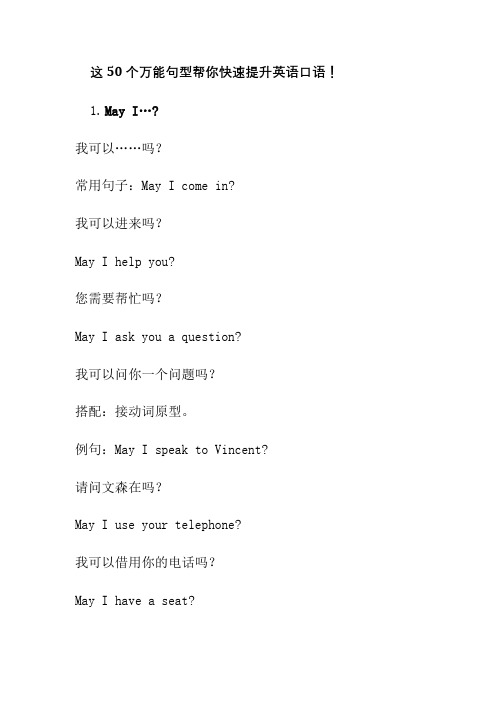
这50个万能句型帮你快速提升英语口语!1.May I…?我可以……吗?常用句子:May I come in?我可以进来吗?May I help you?您需要帮忙吗?May I ask you a question?我可以问你一个问题吗?搭配:接动词原型。
例句:May I speak to Vincent?请问文森在吗?May I use your telephone?我可以借用你的电话吗?May I have a seat?我可以坐下吗?功能: 用这些话显得很有教养。
2. Can you …?你能……吗?常用句子:Can you help me?你能帮帮我吗?Can you do me a favor?你能帮我个忙吗?Can you please tell me where is the bus stop?你能告诉我公共汽车站怎么走吗?搭配:接动词原型。
例句:Can you please shut the door?你能把门关上吗?Can you translate the sentence into Chinese for me? 你能帮我把这个句子翻译成中文吗?Can you lend me some money?你能借我点钱吗?功能:用于比较熟悉的人之间,会让对方感觉亲切。
如果想再客气一点,可以把can换成could。
3. I’d like to …我想……常用句子:I’d like to have a self-introduction. 我想作个自我介绍。
I’d like to talk about the matter.我想谈谈那件事。
I’d like to have a cup of tea.我想喝杯茶。
搭配:加动词原型。
例句:I’d like to book a double-room.我想订一间双人房。
I’d like to change the topic.我想换个话题。
I’d like to have my car repaired.我想请人帮我把汽车修好。
英语四级翻译常见句型
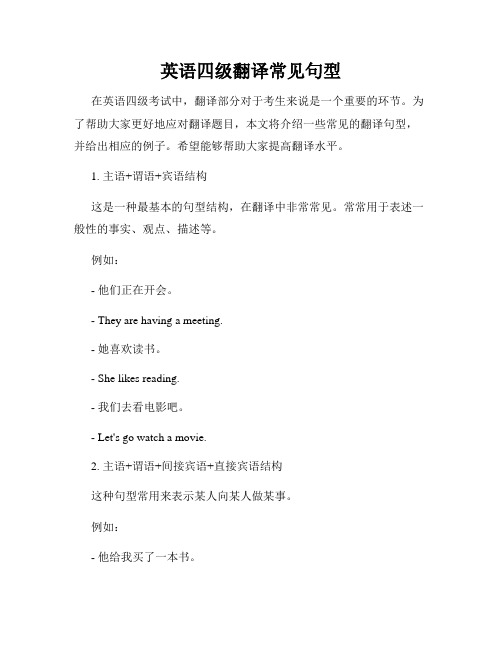
英语四级翻译常见句型在英语四级考试中,翻译部分对于考生来说是一个重要的环节。
为了帮助大家更好地应对翻译题目,本文将介绍一些常见的翻译句型,并给出相应的例子。
希望能够帮助大家提高翻译水平。
1. 主语+谓语+宾语结构这是一种最基本的句型结构,在翻译中非常常见。
常常用于表述一般性的事实、观点、描述等。
例如:- 他们正在开会。
- They are having a meeting.- 她喜欢读书。
- She likes reading.- 我们去看电影吧。
- Let's go watch a movie.2. 主语+谓语+间接宾语+直接宾语结构这种句型常用来表示某人向某人做某事。
例如:- 他给我买了一本书。
- He bought me a book.- 我们给他寄了一封信。
- We sent him a letter.- 她借给我一本小说。
- She lent me a novel.3. 主语+系动词+表语结构这种句型用来表示主语的性质、状态、特征等。
例如:- 青岛是一个美丽的城市。
- Qingdao is a beautiful city.- 他们的想法是正确的。
- Their ideas are correct.- 这个问题很复杂。
- This problem is complicated.4. 主语+系动词+宾语结构这种句型用来表示主语的感觉、看法、认识等。
例如:- 我觉得很累。
- I feel tired.- 他看起来很生气。
- He looks angry.- 他们认为这个计划是有希望的。
- They think the plan is promising.5. 被动语态被动语态在翻译中经常被使用,用来表示主语是动作的承受者。
例如:- 这本小说被翻译成了多种语言。
- This novel has been translated into various languages.- 他被授予了最佳演员奖。
全国翻译专业资格水平考试必备翻译句型13

全国翻译专业资格水平考试必备翻译句型13yet的用法:1.表转折:I would like to go.Yet it rained very hard.2.have not yet done sth尚未做某事3.have yet to do sth尚未做某事/有待做某事4.as yet到目前为止不论是打算宅七天,还是计划出游16天,最怕的是长假结束回不到上班状态,有人会被假期综合症缠上。
Be it a 7-day stay-at-home holiday or a 16-day-long vacation,the least one expects is failure to get everything back on track after delightfully long respite. Some may even develop “holiday hangover/syndrome”.作为混迹职业江湖的老手,对于假期综合症,网友们各自有应对的高招。
有网友说10月7日和10日可安排作为休息日,在家好好调整,睡个大懒觉,这样可以正好可以收收心,准备投入工作。
其实可以将假期最后一天留作缓冲,做些轻松的事,帮助自己精力充沛地投入工作。
Netizens who have long been holiday-work balance have their own ways with the syndrome. Some suggest October 7th and 10th might as well be set aside so that you can rebalance your life and have a nice sleep at home before you retune yourself to work/returning to the battleground. The last day of your holidays is suggested to be your buffer zone whereyou engage yourself in cheerful,less energy sapping-things to refresh and revitalize yourself before getting back to work.老江湖的翻译:1.He is seasoned.老江湖2.He has seen the world.见过大世面3.He is a cheater.老骗子4.He is an outlaw.混江湖的。
英语句子翻译技巧

英语句子翻译技巧以下浅谈英译汉的几点技巧。
第一,翻译时注意英文的句型,英文的句型一般来说有相应的中文译法。
如It的句型的翻译:(1)It is+名词十从句:It is a fact that…事实是……It is a question that………是个问题It is good news that………是好消息it is common knowledge………是常识(2) It is+过去分词十从句:It is said that…据说……I t must be pointed out that…必须指出……It is asserted that…有人主张……It is supposed that…据推测……It is believed that…据信……It must be admitted that…必须承认……It is reported that…据报道……It will be seen from ii that…由此可见……It has been proved that…已证明……It is general1y considered that…人们普遍认为……(3)It is+形容词十从句:It is necessary that…有必要……It is likely that…很可能……It is clear that…很清楚……It is important that…重要的是……(4) It+不及物动词十从句:It follows that…由此可见……It happens that…碰巧……It turne d out that…结果是……第二,注意英语被动句的翻译。
英文的被动句经常用汉语主动句表达,如:You are requested to give a performance英文的被动句译成汉语的主动句:请你给我们表演一个节目。
英文中被动意义也可以用汉语中含有主动意义的句子来表达。
文言文常见句型及翻译

一、主谓结构句型文言文中,主谓结构是最基本的句型。
主语通常位于句首,谓语位于主语之后。
例句:1. 吾友子房,智谋过人。
(我的朋友子房,智谋超过常人。
)2. 月明星稀,乌鹊南飞。
(月亮明亮,星星稀疏,乌鹊向南飞去。
)二、宾语前置句型文言文中,宾语前置是常见的句型,尤其在疑问句和否定句中。
例句:1. 何以解忧?唯有杜康。
(如何解除忧愁?唯有喝杜康酒。
)2. 谁为此谋?(是谁出的这个计谋?)三、定语后置句型文言文中,定语常常位于中心词之后,用以修饰、限制中心词。
例句:1. 马之千里者,一食或尽粟一石。
(日行千里的马,一顿饭有时能吃掉一石粮食。
)2. 古之人不余欺也。
(古人没有欺骗我。
)四、状语后置句型文言文中,状语常常位于句末,用以说明动作、状态或原因。
例句:1. 于是腾蛇乘雾,终为土灰。
(于是腾蛇乘着雾气,最终化为土灰。
)2. 以吾一日长乎尔,毋吾以也。
(因为我比你们年纪大一天,你们不要因此而轻视我。
)五、判断句型文言文中,判断句常用“者”、“也”等字表示判断。
例句:1. 此乃吾所以报先帝之恩也。
(这就是我报答先帝恩情的道理。
)2. 天下兴亡,匹夫有责。
(天下兴亡,每个人都有责任。
)六、省略句型文言文中,省略现象较为普遍,如省略主语、谓语、宾语等。
例句:1. 老吾老以及人之老,幼吾幼以及人之幼。
(尊敬自己的老人,也尊敬别人的老人;爱护自己的子女,也爱护别人的子女。
)2. 吾欲之南海,何如?(我想去南海,怎么样?)总结:文言文句型丰富多样,学习时需细心揣摩,熟练掌握。
通过对常见句型的学习和翻译,有助于我们更好地理解文言文,领略古代文化的魅力。
经典翻译13种句型

经典翻译12种句型
1. It is not until that …
• It was ___________________________ not until I entered college that (直到我进入大学) I realized the importance of English. It was not until she became a mother • _____________________________ (直到 她自己做了母亲) that she understand her mother’s feeling. • It was ___________________________ not until in my third year in high school that (直到高三) this idea to become a writer has taken hold
Maybe I would have sold twice as many copies ( as I had sold) without it.(line43) Subjunctive mood
倍数+as+ adj/adv + as 倍数+more than
eg: My book are three times as many as yours. My income this year is twice as much as I earned last year. If you spent half as much as you did on computer games, you would be a top student in you class.
翻译技巧 常见句型的翻译
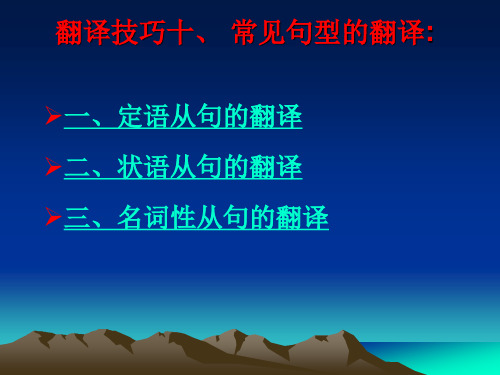
6. He liked his sister, who was warm and pleasant, but he did not like his brother, who was aloof冷漠 and arrogant高傲.
他喜欢热情愉快的妹妹,而不喜欢冷漠高傲的哥哥。
II . 译成后置定语
18.You are the only person who could do it.
只有你才能做这件事。
19. He has a son of twenty who is now at the
college. 他有个二十岁的儿子现在正上大学。 20. This was the first time I had serious trouble with my leader.
二、状语从句的翻译
I. 按照原文顺序译出状语从句
1. If you do not mind, I will turn off the heating. 如果你不介意,我就把暖气关上了。
2. As far as I know, there isn’t such a word in English.
翻译技巧十、 常见句型的翻译:
一、定语从句的翻译 二、状语从句的翻译 三、名词性从句的翻译
一、定语从句的译法
Attributive clauses are widely used in English. In many cases, sentences are made very long because of attributive clauses. Hence it is important to have a correct comprehension and an accurate translation of attributive clauses. Different attributive clauses may express different meanings such as purpose, concession, result and so on. An attributive clause usually follows the word it modifies. This is different from Chinese. In Chinese there is no post-position attribute and there can’t be too many modifiers preceding the modified word. All this causes changes in translating some
初中英语基本句型翻译
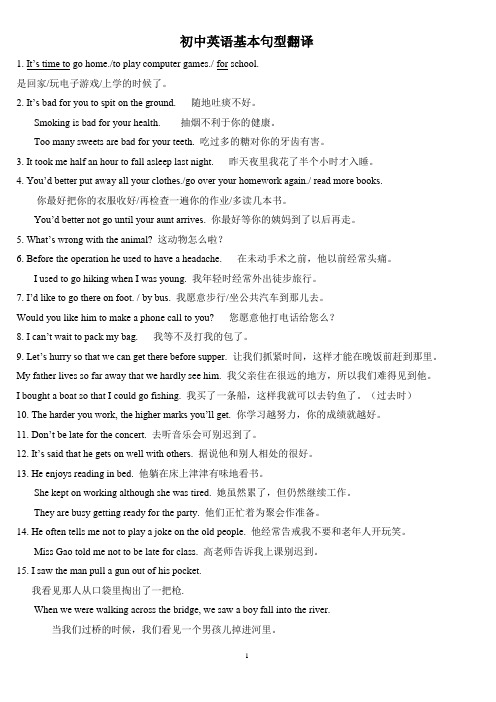
初中英语基本句型翻译1. It’s time to go home./to play computer games./ for school.是回家/玩电子游戏/上学的时候了。
2. It’s bad for you to spit on the ground. 随地吐痰不好。
Smoking is bad for your health. 抽烟不利于你的健康。
Too many sweets are bad for your teeth. 吃过多的糖对你的牙齿有害。
3. It took me half an hour to fall asleep last night. 昨天夜里我花了半个小时才入睡。
4. You’d better put away all your clothes./go over your homework again./ read more books.你最好把你的衣服收好/再检查一遍你的作业/多读几本书。
You’d better not go until your aunt arrives. 你最好等你的姨妈到了以后再走。
5. What’s wron g with the animal? 这动物怎么啦?6. Before the operation he used to have a headache. 在未动手术之前,他以前经常头痛。
I used to go hiking when I was young. 我年轻时经常外出徒步旅行。
7. I’d like to go there on foot. / by bus. 我愿意步行/坐公共汽车到那儿去。
Would you like him to make a phone call to you? 您愿意他打电话给您么?8. I can’t wait to pack my bag. 我等不及打我的包了。
9. Let’s hurry so that we can get there before supper. 让我们抓紧时间,这样才能在晚饭前赶到那里。
基本句型练习题英语

基本句型练习题英语基本句型练习题英语英语是一门非常重要的国际语言,掌握好英语的基本句型对于学习和运用英语来说至关重要。
下面将给大家提供一些基本句型练习题,希望能够帮助大家提高英语水平。
1. 句型:主语 + 动词例句:I eat breakfast every morning.翻译:我每天早上吃早餐。
2. 句型:主语 + 动词 + 宾语例句:She reads books in the library.翻译:她在图书馆看书。
3. 句型:主语 + 动词 + 间接宾语 + 直接宾语例句:He bought me a gift.翻译:他给我买了一份礼物。
4. 句型:主语 + 动词 + 宾语 + 宾补例句:They made her the team captain.翻译:他们让她成为队长。
5. 句型:主语 + 动词 + 宾语 + 宾语补足语例句:We elected him our class president.翻译:我们选他当班长。
6. 句型:主语 + 动词 + 宾语 + 宾语补足语例句:They painted the wall blue.翻译:他们把墙刷成了蓝色。
7. 句型:主语 + 动词 + 宾语 + 宾语补足语例句:She considers him a good friend.翻译:她认为他是个好朋友。
8. 句型:主语 + 动词 + 宾语 + 宾语补足语例句:He found the book interesting.翻译:他觉得这本书很有趣。
9. 句型:主语 + 动词 + 宾语 + 宾语补足语例句:I find the movie boring.翻译:我觉得这部电影很无聊。
10. 句型:主语 + 动词 + 宾语 + 宾语补足语例句:They consider the project a success.翻译:他们认为这个项目很成功。
以上是一些常见的基本句型练习题,通过这些练习题,可以帮助大家更好地理解和掌握英语的基本句型。
汉译英常见句型
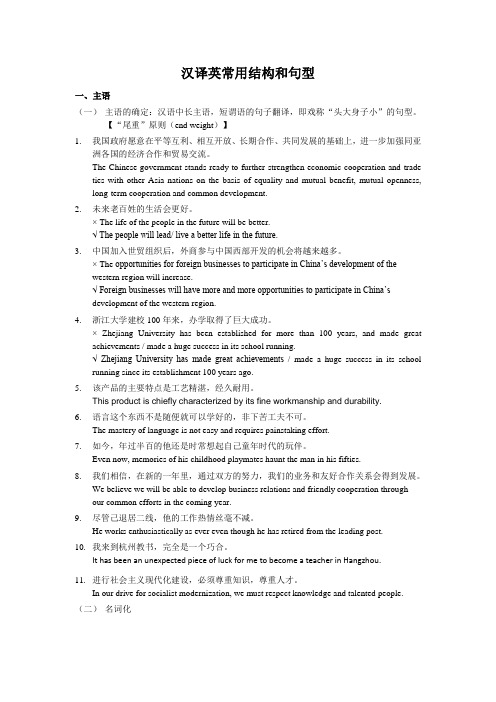
汉译英常用结构和句型一、主语(一)主语的确定:汉语中长主语,短谓语的句子翻译,即戏称“头大身子小”的句型。
【“尾重”原则(end weight)】1.我国政府愿意在平等互利、相互开放、长期合作、共同发展的基础上,进一步加强同亚洲各国的经济合作和贸易交流。
The Chinese government stands ready to further strengthen economic cooperation and trade ties with other Asia nations on the basis of equality and mutual benefit, mutual openness, long-term cooperation and common development.2.未来老百姓的生活会更好。
× The life of the people in the future will be better.√ The people will lead/ live a better life in the future.3.中国加入世贸组织后,外商参与中国西部开发的机会将越来越多。
× The opportunities for foreign businesses to participate in China’s development of thewestern region will increase.√ Foreign businesses will have more and more opportunities to participate in China’sdevelopment of the western region.4.浙江大学建校100年来,办学取得了巨大成功。
×Zhejiang University has been established for more than 100 years, and made great achievements / made a huge success in its school running.√ Zhejiang University has made great achievements/ made a huge success in its school running since its establishment 100 years ago.5.该产品的主要特点是工艺精湛,经久耐用。
读后续写高分句型翻译+课件-2025届高三英语上学期一轮复习专项
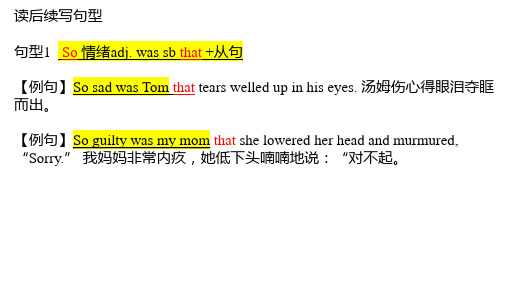
1.焦虑和不安 焦虑和不安的艾米在等待医生的诊断结果。 Anxious and uneasy, Amy waited for the doctor's diagnosis. 2.沮丧和挫败 感到沮丧,挫败,汤姆在考试失败后独自坐在教室里。 Frustrated and defeated, Tom sat alone in the classroom after failing the exam. 3.困惑和好奇 感到困惑,好奇,李华试图解开这个谜一样的案件。 Confused and curious, Li Hua tried to solve the mysterious case. 4.放松和舒适 在温泉里泡了一个下午后,放松和舒适的张丽感觉整个人都焕然一新。 After soaking in the hot spring for an afternoon, relaxed and comfortable, Zhang Li felt
3.他看着窗外的雨,不确定自己是否应该出门。 He looked out at the rain, unsure of whether he should go out.
4.他对自己的未来感到不确定,不知道该如何选择。 He felt uncertain about his future, not knowing how to make a choice.
1.他在黑暗中摸索前进,对前方一无所知。 He groped forward in the dark, unaware of what was ahead.
科技英语的翻译——13 句子成分的强调、倒装、分隔和省略

句子成分的强调、倒装、分隔和省略1.强调通过添加强调词、采用强调句型或改变成分的结构位置等手段来突出某一部分。
(1)添加强调词[例句] Beta is approximately constant for an individual transistor, although it does vary with temperature and slightly with the collector current.(强调动词do)[译文] 对某个晶体管而言, 近似为常数,尽管它确实会随温度及集电极电流的变化而变化。
(2)采用强调句型It is (was) + 被强调的成分+ that (which, who, whom),可强调主语,宾语和状语,不能强调定语和谓语。
[例句] We conclude that it is the ratio of the average signal power to the average noise power that is important, and not the magnitudes of S and N themselves.[译文] 我们得到结论,平均信号功率与平均噪声功率之比是重要的,而信号与噪声本身幅度的大小并不重要。
(强调主语)[例句] Ironically, it was Bell himself who invented one of the earliest light-wave communications devices in 1880.[译文] 讽刺地是,正是比尔本人于1880年发明了最早的光波通信设备之一。
(3)改变句子成分的结构位置[例句] Very obvious is the ever-growing influence on mankind by the adoption of radio- broadcasting both sound and television.(倒装强调)[译文] 非常显著的是,无线电及电视广播的应用,对人类产生的日益增长的影响。
高一英语必修一必背句型翻译详细归纳
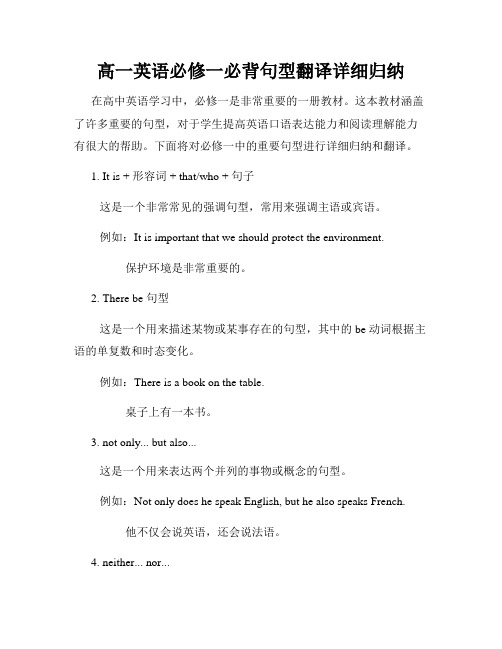
高一英语必修一必背句型翻译详细归纳在高中英语学习中,必修一是非常重要的一册教材。
这本教材涵盖了许多重要的句型,对于学生提高英语口语表达能力和阅读理解能力有很大的帮助。
下面将对必修一中的重要句型进行详细归纳和翻译。
1. It is + 形容词 + that/who + 句子这是一个非常常见的强调句型,常用来强调主语或宾语。
例如:It is important that we should protect the environment.保护环境是非常重要的。
2. There be 句型这是一个用来描述某物或某事存在的句型,其中的 be 动词根据主语的单复数和时态变化。
例如:There is a book on the table.桌子上有一本书。
3. not only... but also...这是一个用来表达两个并列的事物或概念的句型。
例如:Not only does he speak English, but he also speaks French.他不仅会说英语,还会说法语。
4. neither... nor...这是一个用来表达否定选择或否定同时发生的句型。
例如:Neither my father nor my mother is at home.我爸爸和我妈妈都不在家。
5. so + 形容词/副词 + that...这是一个用来表达结果的句型,常用于表示程度或原因。
例如:The movie was so exciting that everyone stood up and applauded.这部电影太令人激动,以至于大家都站起来鼓掌。
6. such + 名词 + that...这是一个用来表达程度的句型,表示非常/如此...以至于...例如:She is such a clever girl that she can solve any problem.她是个非常聪明的女孩,可以解决任何问题。
- 1、下载文档前请自行甄别文档内容的完整性,平台不提供额外的编辑、内容补充、找答案等附加服务。
- 2、"仅部分预览"的文档,不可在线预览部分如存在完整性等问题,可反馈申请退款(可完整预览的文档不适用该条件!)。
- 3、如文档侵犯您的权益,请联系客服反馈,我们会尽快为您处理(人工客服工作时间:9:00-18:30)。
常见句型的翻译——定语从句的翻译
• 3. 成都 • 一个你来了就不想离开的城市。 • Chengdu—A city you will never want to say goodbye after arrival. • 4. In recent years, however, people have begun to become aware that cities are also areas where there is a concentration of problems. • 可是,近几年来人们开始意识到城市也是问 题成堆的地方。
• This is the cat that killed the rat that ate the cake that lay in the house that Jack built. • *这就是那只捕杀了偷吃了放在杰克造的房屋内的 蛋糕的老鼠的猫。 • 这就是那只捕杀了老鼠的猫。老鼠偷吃了放在屋 里的蛋糕。那屋是杰克盖的。 • Nearly everyone knows the story of “the dog that worried the cat that caught the rat that ate the grain that lay in the house that Jack built.” • 几乎人人都知道这个故事:“ 杰克盖了房,房里 堆了粮,耗子把粮吃光,猫把耗子抓伤,狗又把猫 逼上房。”
常见句型的翻译
常见句型的翻译:
• • • • 定语从句的翻译 状语从句的翻译 名词性从句的翻译 练 习 1、2、3
• 常见句型的翻译:
• 定语从句的翻译 • 状语从句的翻译 • 名词性从句的翻译
常见句型的翻译——定语从句的翻译
定语从句的译法
Attributive clauses are widely used in English. In many cases, sentences are made very long because of attributive clauses. Hence it is important to have a correct comprehension and an accurate translation of attribute clauses. Different attributive clauses may express different meaning such as purpose, concession, result and so on. An attributive clause usually follows the word it modifies. This is different from Chinese. In Chinese there is no post-position
常见句型的翻译——定语从句的翻译
• 23. Rose took Chinese medicine which relieved her symptoms. • 罗斯服了中药,结果缓解了症状。(译成结果状 从) • 24. There is no bad habit that may not be cured by a strong willpower. • 只要有坚强的意志,就没有什么坏习惯改不掉。 (译成条件状从) • 25. The newswoman wishes to write an article that will attract public attention to shipwreck. • 这位女记者想写篇文章,以便能够引起公众对那 起沉船事件的注意。(译成目的状语从句)
常见句型的翻译——定语从句的翻译
• 13. She was very patient towards the children, which her husband seldom was. • 她对孩子们很耐心,而她丈夫却很少这样。 • 14. They seem to enjoy those rewards which they had purchased by a course of unmerited fatigue, and by victories which almost exceeded belief. • 他们对那些酬劳看来是很得意的,那些酬劳 是他们历经千辛万苦,通过取得令人难以置 信的胜利得来的。
常见句型的翻译——定语从句的翻译
• 当然,有些起附加说明作用的非限制性定语从句, 对先行词也有不同程度的修饰限制作用,有时也可 以译为前置定语。 • 5. The sun, which had hidden all day, now came out in all its splendor. • 那个整天躲在云层里的太阳,现在又光芒四射地露 面了。 • 6. He liked his sister, who was warm and pleasant, but he did not like his brother, who was aloof and arrogant. • 他喜欢热情愉快的妹妹,而不喜欢冷漠高傲的哥哥。
常见句型的翻译——定语从句的翻译
IV. 译成状语
• 有些定语从句从形式上看是定语,但在意义上与主 句有逻辑状语关系,对主句其原因、结果、目的、 条件、让步等状语作用,翻译时应尽可能按照其语 法功能,译成与汉语相对应的复句。 • 21. The computer, which seems to play the role of a human brain, is often called an electronic brain. • 由于计算机起着类似人脑的作用,所以常常被称作 电脑。(译成原因状从) • 22. She insisted on buying another pair of roller skates, which she had no use of. • 她坚持要再买一双溜冰鞋,尽管她还用不着。(译 成让步状从)
• 1. To be sure, a great rebuilding project would give jobs to many of those people who need them. • 诚然,一个宏伟的重建计划也许能为许多需要工作的 人提供就业机会。 • 2. This is the solider who just returned from the front. • 这是刚从前线回来的战士。
• This is the cat. • 这就是那只猫。 • This is the cat that killed the rat. • 这就是那只捕杀了老鼠的猫。 • This is the cat that killed the rat that ate the cake. • *这就是那只捕杀了偷吃了蛋糕的老鼠的猫。 • This is the cat that killed the rat that ate the cake that lay in the house. • *这就是那只捕杀了偷吃了放在屋内的蛋糕的 老鼠的猫。
常见句型的翻译——定语从句的翻译
• 18.You are the only person who could do it. • 只有你才能做这件事。 • 19. He has a son of twenty who is now at the college. • 他有个二十岁的儿子现在正上大学。 • 20. This was the first time I had serious trouble with my leader. • 这是我第一次和领导发生严重纠葛。 • There is a man who follows behind you for long. • 有个人跟在你后面好长时间了。
常见句型的翻译——定语从句的翻译
• 8. Matter is composed of molecules that are composed of atoms. • 物质是由分子组成的,而分子又是由原子组成的。 • 9. But listen, I met a man, who said you could solve this problem.
常见句型的翻译——定语从句的翻译
III、ห้องสมุดไป่ตู้合译法
• 溶合法就是把原句子中的主语和定语从句溶合在 一起译成一个独立句子的翻译方法。另外,由于 限制性定语从句与主句的关系密切,所以,限制 性定语从句似乎更适合采用溶合法。英语中突出 的 “there be” 句型就是这样处理的。 • 16. There are many people who want to select this major. • 许多人要选这个专业。 • 17. There is a man downstairs who wants to see you. • 楼下有人要见你。
• 听着,我遇见一个人,这个人说你能解决这个问 题。 • 10. Day light comes from the sun, which is a mass of hot, glowing gas. • 日光来自太阳,太阳是一团炽热、发光的气体。
常见句型的翻译——定语从句的翻译
• B、 非限制性定语从句与先行词的关系不十分密切, 只是对先行词加以说明,描述或解释,或对整个句 子所陈述的事实或现象加以总结、补充说明,其前 都有逗号分开。在汉译时一般译为后置并列分句。 如: • 11. He blamed me for everything, which I thought very unfair. • 他把一切错误都归罪于我,我认为这很不公平。 • 12. These books, which are only a small part of my collection, I picked up in American. • 这些书是我在美国买,它们在我的藏书中只占一 小部分。
